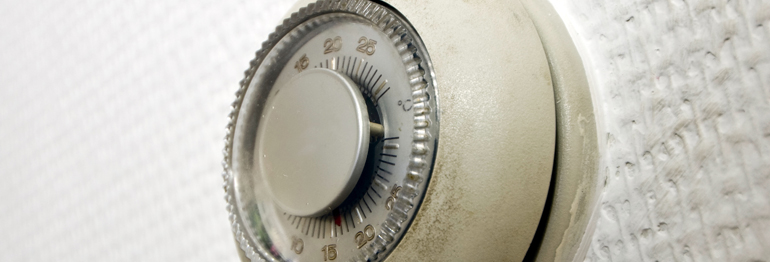Turning down the thermostat to save some money could cost older women by raising their risk of falls, according to a new European study. In an experiment with 88 women over age 70, researchers found that just 45 minutes of exposure to chilly room temperatures hampered muscle responses and walking ability.
“This is really quite striking for such a short period of time,” Professor Dawn Skelton told Reuters Health. ”The colder temperature we used was only one degree below what you are legally allowed to keep an office building.” Research has shown that muscle has to be at a certain temperature in order to work properly, said Skelton, a professor at Glasgow Caledonian University in Scotland and an author of the study. ”This is true even in younger people where a drop by just one degree could mean a 25 percent loss of muscle power,” she said.
“With regard to the global climate change, a decrease of retirement pensions, and rising costs for heating energy, we thought that there will be older persons in cold flats (apartments),” said Dr. Ulrich Lindemann, a physician at the Robert-Bosch-Hospital in Auerbachstr, Germany, who led the research.
He and his colleagues recruited 88 women between the ages of 70 and 95 who were not living in nursing homes and had them perform physical tests after sitting for 45 minutes in a room where the temperature was either 59 F (15 C) or 77 F (25 C).
Women were randomly assigned to a warm room or a cool one, then a week after the first round, they came back and did the same tests in the alternate environment.
The trials included pushing a metal plate using one foot, walking, sitting in a chair and getting up again and a measurement of hand grip-strength.
To ensure there was no buildup of internal heat in the women’s muscles because of leg activity, participants were not allowed to move for the 45-minute exposure period and they were only allowed to wear light clothing, such as thin trousers and pullovers.
At 59 F, the average skin temperature of the women dropped 6 degrees from 89.5 F to 83.5 F and the women did worse on almost all their performance tests with the exception of the hand-grip test, on which they did slightly better in the colder temperature.
Otherwise, compared to the warmer room, the drop in performance rate after exposure to cold ranged from two to ten percent, the researchers report in the journal Age and Ageing.
In the colder environment, strength in the quadriceps muscle of the leg fell by 6 percent, for example, and the women’s speed in going from sitting to standing fell by 10 percent.
“These were relatively healthy women assessed after only 45 minutes of exposure,” Lindemann noted. “An even higher risk may be suggested for frail older persons who stay in their flats longer.”
In their report, the researchers note that so-called explosive muscle power was reduced in the cold room and that capability – the speediness of muscle responses – is perhaps more relevant than muscle strength in an older person’s ability to react when they need to stop a fall, for example.
A part of the problem, Skelton noted, is that older persons spend a lot of time sitting, not using their muscles to do activities that could contribute to building up internal heat.
“Regular movement is a great way of regulating heat. It’s another reminder that we should get up and move about, she said.
Skelton cautioned that more research is needed to find an ideal temperature for older women’s health and comfort, but, she said, “Probably around 18 degrees as a minimum but preferably 20 degrees (that’s 64 – 68 F).”
Susan Macey, a recently retired researcher at Texas State University in San Marcos told Reuters Health the study is important.
“With seniors, and especially older women, making up a higher proportion of our population, it is important to study basic aspects of their living conditions that may impact their health,” she said.
“As the authors point out, something as simple as a lower temperature environment may contribute to the potential for more serious health concerns such as falls,” added Macey who was not involved in the study.
“Seniors, family members or caregivers, can benefit from an increased understanding of the link between such a simple, everyday decision as what temperature to keep the house at and how this may impact their health and mobility,” she said.
SOURCE: Age and Ageing, online May 22, 2014.
http://www.reuters.com/article/2014/06/10/us-older-women-indoor-cold-idUSKBN0EL24820140610?feedType=RSS&feedName=healthNews
If we can be of assistance to you or your family, please contact our experienced Mississippi Elder Law Attorneys at Courtney Elder Law Associates by calling 601-987-3000.
